#victims of the death camp. It will never be a fandom property and it can’t be and I’ll be separated from fandom and Disney corporate
Explore tagged Tumblr posts
Text
might make a thing about what andor means to me as a Jew.
#It’s just like it’s not fandom for me and it can’t be. It’s a piece of literature recording the experiences of#victims of the death camp. It will never be a fandom property and it can’t be and I’ll be separated from fandom and Disney corporate#Structures forever#When I think of eps 8-10 I can’t breathe. I can’t think. I feel fear beyond measure#Im glad they exist
17 notes
·
View notes
Text
Marvel Cinematic Universe: Captain America: The First Avenger (2011)
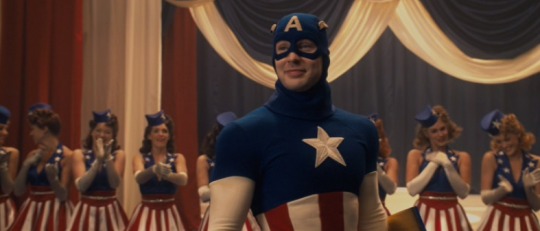
Does it pass the Bechdel Test?
No.
How many female characters (with names and lines) are there?
One (7.69% of cast).
How many male characters (with names and lines) are there?
Twelve.
Positive Content Rating:
Three.
General Film Quality:
Excellent! Full of as much heart as action, the film takes on the complicated task of delivering a Captain America for the modern world, avoiding jingoism while also acknowledging the origins which brought the comic-book hero into being. Against the odds (and my personal expectations), it is a sound success, and I consider it easily the best of the Marvel franchise’s early films.
MORE INFO (and potential spoilers) UNDER THE CUT:
Passing the Bechdel:
Obviously, that didn’t happen.
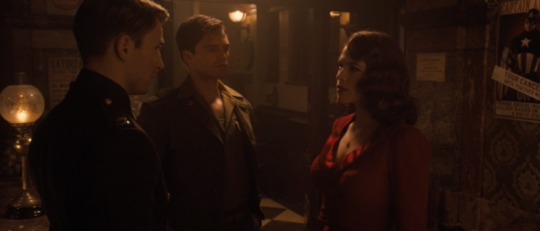
Female characters:
Peggy Carter.
Male characters:
Johann Schmidt.
Steve Rogers.
James ‘Bucky’ Barnes.
Howard Stark.
Abraham Erskine.
Arnim Zola.
Gilmore Hodge.
Chester Phillips.
Brandt.
Fred Clemson.
Timothy Dugan.
Nick Fury.
OTHER NOTES:
I’m mad about the Hydra symbol being the coolest insignia in this franchise. I would wear the heck outta some Hydra merchandise, if it weren’t for the, y’know, evil Nazi fascism stuff.
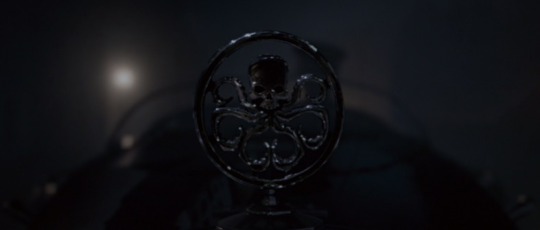
I love little Steve. They pulled that off so well.
I don’t love that Peggy’s introduction revolves around her being disrespected by a guy and then knocking him on his ass. It feels far too prescribed, too Strong Woman Cliche, so expected as to be rendered essentially meaningless. It implies that these are the most important things about the character - she’s a woman and she’s tough - and it panders to the sexist perspective by requiring Peggy to ‘prove herself’ upon arrival in a traditionally-masculinised way. They could have handled this introduction much better.
Man. This movie has such a good cast. The goodness of this cast has no chill.
“So many people forget that the first country that the Nazis invaded was their own.” This the good shit.
“Go get him! I can swim.” Snort.
Sometimes, when I can’t sleep, ‘Star Spangled Man’ plays over and over again in my head. That’s probably why I can’t sleep.
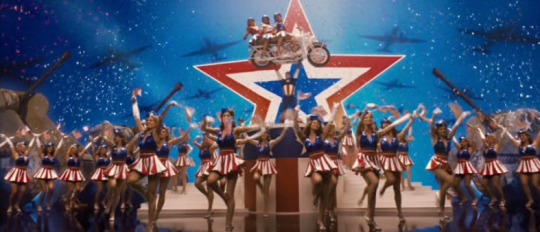
“Do you...fondue?”
The thing where someone gets hit and they fly off-screen in an exaggerated fashion is never not funny to me.
Characters surviving explosions without a scratch, however, is never not rubbish to me.
A super-soldier is never late, Peggy Carter, nor is he early; he arrives precisely when he means to.
Steve really isn’t very precious about choosing his team: they’re all just Bucky’s friends. He basically just went “ok, show of hands, who loves Bucky Barnes? Good, you guys are with me”. I mean, it’s solid reasoning - he trusts Bucky, and these guys have Bucky’s endorsement, and that’s good enough for Steve. I note that only one of the other guys on the team besides Steve and Bucky is a white American - the other guys are a black American and an Asian-American (and I see you there, recognition of racism against Japanese-Americans which led to their incarceration during the war, etc.), and then there’s a French dude and a Brit. That’s Captain America’s elite team: not all-American, and racially inclusive. I DIG that subtext.
*hisses* why is this whole Natalie-Dormer-mackin’-on-Steve thing even here? It’s a useless contrivance, plus I am extremely displeased at having Peggy being so petty in her jealousy that she actually fires a loaded gun straight at Steve. I sure hope she heard Howard’s explanation about the properties of the vibranium shield, or that she already knew them, because otherwise this is completely outrageous, but even then: what if the shield hadn’t performed as advertised? What if a bullet ricocheted and hit someone else? This is such a dangerous thing to do, and did I mention it is in service of a useless contrivance anyway? Peggy deserves better writing.
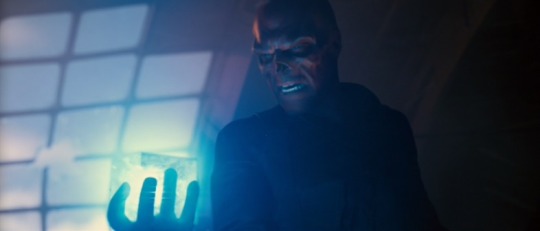
Lemme tell ya straight up: I thought I was gonna hate this movie. I mean...it’s Captain America. I expected cloying patriotism, a blandly self-righteous hero, probably some good ol’ war glorification as well. What we got instead was a film that barely even mentioned the good ol’ USA outside of the (explicitly recognised as) propaganda rigmarole that Captain America slogs through - a tool used to excellent effect to acknowledge the character’s history (the comic was created as propaganda during WWII in real life) while also carrying through the idea that what Captain America stands for is something far grander than nationalist fervour - and Steve himself is imbued with unassuming charm, fueled by the strength of his personal convictions but never forcing those convictions upon others in a show of moral grand-standing: an essential facet of the character is that he’ll pursue what he believes to be right regardless of whether anyone else follows him, and he accepts that there are consequences to his actions; he never props himself up with holier-than-thou declarations, he never shames anyone for disagreeing with him, and he never claims any kind of superiority over others (an important distinction when you’re juxtaposed with a Nazi Ubermensch villain). Other characters are inspired by Steve, but the film wisely never positions them as if they were weak or wavering without the symbol of Captain America to unite them: the war is a grindhouse, and they know the only way out is through. No one is fighting because they perceive battle as a great and noble cause, nor because they are righteously empowered; they fight because their enemy is too terrible to let pass, and there is no room for glory in that.
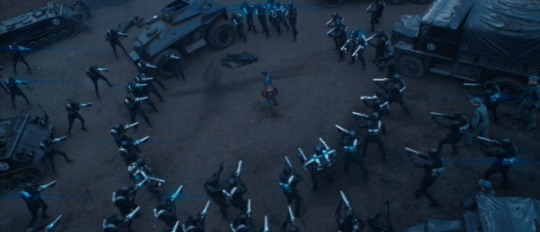
I can (and will) still quibble about the representation of war in the film: while the fact that it is sparingly shown does help to avoid the glorification of violence and death in battle, it also undersells the horror of war, which runs the risk of looping back around to glorification by making it all into fun skirmishes with faceless goons and glow-weapons. Additionally, Captain America clashes exclusively with Hydra and its operatives; while Red Skull severs his ties with Hitler early on through the welcome disintegration of a few Nazi representatives, the film cannot entirely distance itself from Hitler’s legacy (which Red Skull actively takes on for himself), and I take long-standing issue with anything which uses Nazis as an evil catch-all but fails to acknowledge and respect the victims of their reign. After Steve’s heroic nose-dive in the Valkyrie ends Hydra’s campaign, the film cuts to celebrations of the end of the war; they don’t actually state that it was Captain America who just defeated the Nazis by taking down Red Skull (despite the fact that Hydra’s soldiers with their fancy tech and also, um, actual-Hitler and his armies, are all still out there), but the implication is there, and it feels a mite bit insensitive, to say the least. I do think it is better that Steve has his own corner of the war to fight, rather than taking on the whole thing and battling actual-Hitler in the end (now THAT would be insensitive), but I do wish that the destruction and evil of the war at large were the backdrop of the film, rather than the comparatively sanitised Hydra operation that we see.
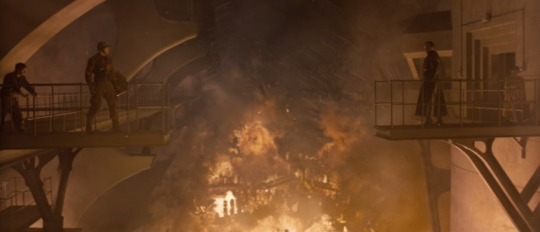
In this context, the weight of the war and the toll that it takes on the psyche of those suffering through it is carried almost exclusively by Bucky Barnes, who emerges from the unseen tortures of a Hydra work camp changed, his buoyant enthusiasm from the beginning of the film subdued, locked up behind the shattered look in his eyes and the fragile way he carries himself, determined to see this thing through to the end so that he can fall apart later, if he makes it that far (he doesn’t). Fandom has made much of Sebastian Stan’s understated performance, and with good reason: despite a minimal number of scenes there is a richness of detail in Bucky’s character, and as the emotional sinking ground for tragedy - both as the personification of the war’s devastation, and as a personal loss for Steve Rogers - Bucky’s narrative importance belies the amount of time dedicated to him in-text. Fandom has also made a strong point - with which I agree entirely and for which I will not pretend to take unique credit for noticing - that despite expectation, Bucky’s archetypal function in the film is not as the Hero’s Sidekick; he is, in actuality, fulfilling the cliche of the Love Interest, not in competition with Peggy Carter but instead of; Peggy, likewise, is not an archetypal Love Interest at all, because she’s the Hero’s Sidekick.
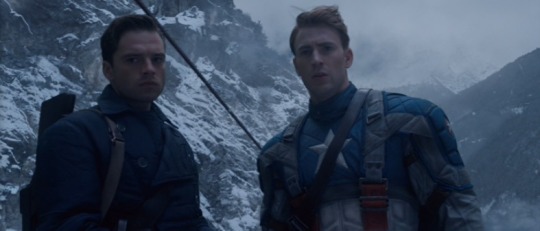
I am entirely of the opinion that this is an essential part of what makes Peggy - the sole named female character in town - work out so well, against the odds. As Steve’s sidekick, Peggy’s primary functions are to support him and give him advice; the sidekick is traditionally a rational role, someone who keeps the hero grounded and helps them to make the right choices, especially when they are emotionally conflicted. The Love Interest compels the hero’s emotions, sometimes (often) framed as driving them to acts of recklessness, to joyous heights, and depressive lows. Bucky is Steve’s damsel in distress; Steve is compelled to act when he learns that Bucky has been captured by the enemy, action which is tempered and assisted by Peggy’s influence and which ultimately brings Captain America out of propaganda mode to practice what he has preached, and be the soldier Steve always hoped to be. When Bucky falls, Peggy is there to talk to Steve, as a friend, and help him stop wallowing and concentrate his grief into the resolve which carries him through the climactic confrontations of the film’s final act. I’m not going to argue that Steve wanted to join the army just to be with Bucky (presumably that was a factor to some extent, but to call it the primary motivator would be to ignore the value set which made Steve into Captain America in the first place), nor that he was willing to sacrifice himself in the end because Bucky was gone (Steve’s mourning for Bucky certainly played a role in his mental state at the time, but ultimately, bringing down the Valkyrie was a practical choice, not an emotional one), but undeniably, Bucky was either integrally or tangentially attached to all of Steve’s major decisions across the film, as is common for a Love Interest, whereas Peggy consistently filled a support-and-guidance role, as any good sidekick should.
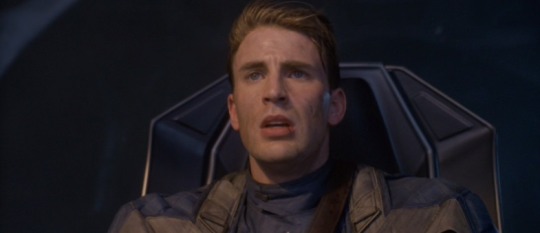
This is not to imply, by any measure, that Peggy can’t or shouldn’t be seen as a viable (lower case) love interest (or that Bucky’s time as a hero’s sidekick somehow doesn’t count as what it is); actually, I think that both character’s relationships with Steve benefit from being framed in this switched fashion. Bucky’s lifelong friendship with Steve comes across stronger and more meaningful due to the emotional pitch, allowing it to resonate as something deeply significant to Steve despite the limited exposure we have to it in action - extra important considering that Bucky is also fulfilling that sacrificial-character role. For Peggy, the fact that she is presented as a love interest but coded as a Hero’s Sidekick is even more important in its effect: since she is the only woman around, we have been taught by approximately All Media Ever to perceive her as the Love Interest from the second she steps on screen, and with that perception we are also encouraged to devalue her character as essentially existing for no other purpose than to be an attractive female prize for the Manly Male Hero to win by story’s end. By reinforcing Peggy as a friend to Steve, we subvert the expectation that she has no real function and/or that her personality is irrelevant, because narrative coding has taught us that sidekicks (almost exclusively male) matter, they have things to say and their influence on the hero is meaningful. Whether they are stalwart sidekicks, or bumbling fools, comedic, or secretly-insidious, a sidekick should be noted, because they’re a lot more likely to have something plot-relevant going on than a boring old Love Interest. Being presented as a helpful, sympathetic presence in Steve’s life who also Has Her Own Shit Going On allows Peggy to meet Steve on more even ground, and her interactions with him are not built around being romantically or sexually available: by having a working relationship built on a foundation of understanding friendship rather than attractive chemistry, the development of feelings between the characters comes across more as extraneous and organic, rather than a prescribed cliche. It still is a prescribed cliche, but it’s not one that compels Steve to do dumb stuff or that undermines Peggy’s relevance as a person in her own right, and that makes it a much more palatable romance than what we usually get.
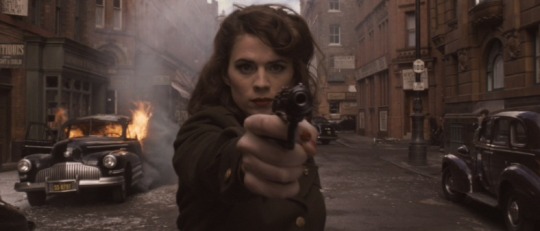
This is also why that idiotic ~jealousy~ contrivance I flagged earlier is so out of place - I mean, it’s out of place because it’s idiotic, it has no impact on the story in any way and its an insult to the characters and I don’t know why it exists or why they kept it in the final cut of the film because it’s asinine rubbish, but it’s also out of place because it approaches Peggy as a Love Interest, scorned and emotionally lashing out, an attempt to generate Love Interest drama where it has no place in the movie, for the characters as the people that they are, with the established dynamic that they have, or in the context of their situation. Throwing a misunderstanding and some hurt feelings on top of a relationship which has worked refreshingly well thus far because of the honest and open conversations the characters have shared is utterly tone-deaf, and it’s one black mark on what is otherwise a shockingly strong and tonally-consistent film. She may be all alone in the movie, but I will happily argue that Peggy is the best, most-rounded female character in the MCU at this early stage, and she’s playing across from an eminently worthy leading man in Chris Evans’ charmingly-sincere Steve Rogers. The supporting cast is there - Seb Stan, of course, but also Stanley Tucci! Tommy Lee Jones! HUGO WEAVING! - being wonderful and engaging across the board, and there are no weak links (except Natalie Dormer, but that’s not her fault, and at least the misstep is brief and POINTLESS so that it doesn’t taint the rest of the film). Captain America: The First Avenger may not be absolutely perfect - nothing is - but it is a great ride, sometimes surprisingly nuanced, sometimes intriguingly subversive even while it plays straight with the expectations of its genre. I went into my first viewing of the film just hoping it wouldn’t make me mad, and I gotta tell ya: I ain’t mad at all. As far as I’m concerned, this is the platonic ideal of superhero films.
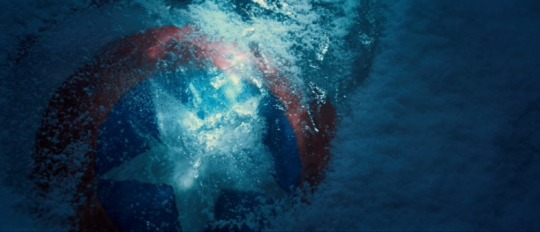
#Captain America: The First Avenger#MCU#Marvel Cinematic Universe#Bechdel Test#female representation
17 notes
·
View notes